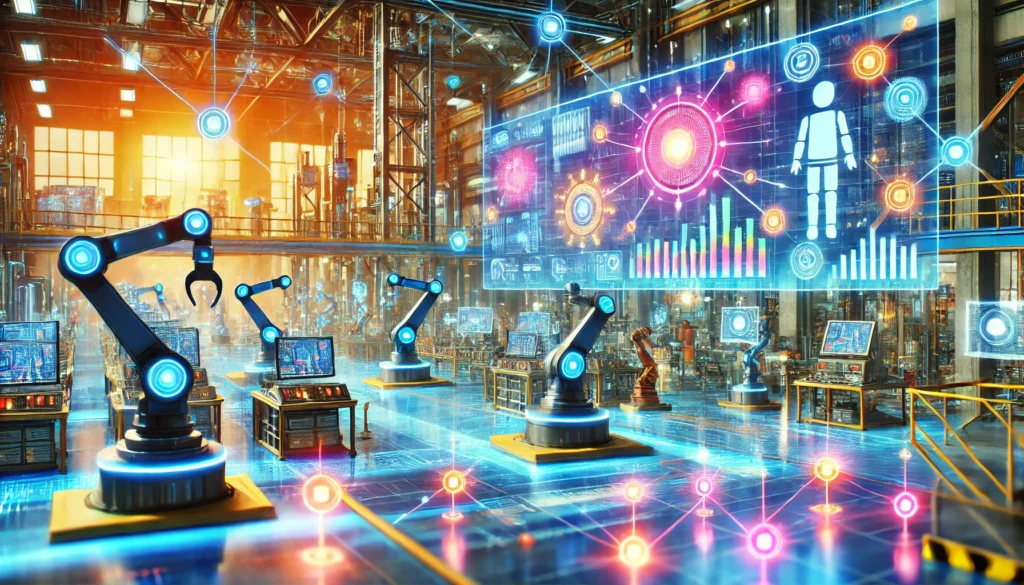
Interim CIO: Dr. Claus Michael Sattler
The future of production: From Industry 4.0 AI and data platforms

The fourth industrial revolution is in full swing, and the combination of Industry 4.0, AI and data platforms is revolutionizing the manufacturing landscape. These technologies promise not only an increase in efficiency and productivity, but also completely new opportunities for innovation and value creation.
The basics of modern production
Industry 4.0 refers to the intelligent networking of machines and processes in industry [source: 5]. This networking enables unprecedented flexibility and efficiency in production. Artificial intelligence (AI) plays a key role in this by analyzing the enormous amounts of data generated in networked systems and gaining valuable insights from them.
Data platforms form the backbone of this new industrial landscape. They enable the integration of different data sources and provide the necessary infrastructure for advanced analytics and AI applications [source: 3].
AI as a driver of innovation
AI has many applications in modern production:
- Quality control: AI-based image processing systems can detect and sort out faulty products with high precision [source: 2].
- Predictive maintenance: By analysing machine data, AI can predict potential failures and thus minimize unplanned downtimes [source: 3].
- Process optimization: AI algorithms can optimize production processes in real time and thus increase efficiency [source: 1].
- Automated decision-making: In some areas, AI systems can already make autonomous decisions, for example in camera-based object recognition [source: 4].
The role of data platforms
Data platforms are the foundation on which modern production systems are built. They fulfill several important functions:
- Data integration: Data platforms enable the seamless integration of data from various sources, from sensors on machines to ERP systems [source: 6].
- Data analysis: Advanced analysis tools on the platforms make it possible to gain valuable insights from the collected data [source: 6].
- IoT integration: Modern data platforms are designed to communicate with IoT devices and process their data [source: 3].
- Scalability: With growing data volumes and increasing complexity of analyses, data platforms offer the necessary scalability [source: 3].
Challenges and solutions
Despite the enormous potential of Industry 4.0, AI and data platforms, companies face a number of challenges when it comes to implementation:
- Lack of data: Many companies struggle with the problem of relevant data being trapped in silos [source: 4]. One solution to this is edge computing, where data processing takes place closer to the data source [source: 4].
- Complexity: The integration of different systems and technologies can be very complex. Scalable and open ecosystems that enable step-by-step implementation can help here [source: 7].
- Employee qualifications: The use of new technologies often requires new skills. Continuous training and the use of user-friendly tools, such as AI-supported assistants, can help here [source: 7].
- Security and data protection: As networking increases, so do the security risks. Robust security concepts must be integrated into the systems from the outset.
Future prospects
The future of production, characterized by Industry 4.0, AI and data platforms, promises exciting developments:
- Autonomous factories: With advancing AI technology, factories could operate largely autonomously in the future, with minimal human intervention.
- Personalized mass production: The flexibility of modern production systems could enable the cost-effective manufacture of individualized products on a large scale.
- Circular economy: Data-driven approaches could drastically increase resource efficiency and thus contribute to more sustainable production.
- New business models: The availability of real-time data and advanced analytics could give rise to completely new, data-driven business models.
Conclusion
The combination of Industry 4.0, AI and data platforms is ushering in a new era in industrial production. It not only promises efficiency gains and cost savings, but also opens up completely new opportunities for innovation and value creation.
Companies that successfully implement these technologies will be able to respond more flexibly to market changes, continuously optimize their processes and offer innovative products and services. The road ahead may be challenging, but the potential rewards are enormous.
The future of production will be characterized by intelligent, networked systems that are able to learn and adapt autonomously. Companies that set the course for this future now will be in the best position to benefit from the opportunities of the fourth industrial revolution.
Industry 4.0, AI and data platforms are not just buzzwords, but the building blocks of a new industrial reality. Understanding and using them will be crucial for success in the production of tomorrow.
Sources
- https://www.fastec.de/aktuelles/best-practice-ki-machine-learning/
- https://www.de-hub.de/blog/post/industrie-40-welche-chancen-bietet-der-einsatz-kuenstlicher-intelligenz/
- https://stackable.tech/de/datenplatform-fuer-industrie/
- https://www.it-zoom.de/mittelstand/e/ein-kontra-dem-datenmangel-32411/
- https://www.zeiss.de/corporate/c/stories/insights/ki-industrie-40.html
- https://www.criticalmanufacturing.com/de/mes-fuer-industrie-4-0/die-iot-datenplattform-fuer-fertigungsunternehmen/
- https://ind-ai.net/technologie/mit-zentraler-datenplattform-zu-iiot-und-ki/
- https://safe-intelligence.fraunhofer.de/artikel/ki-in-der-produktion
- https://www.ingenieur.de/fachmedien/vdi-z/digitalisierung-vdi-z/big-data-management-fuer-die-industrie-4-0/
- https://www.ingenieur.de/fachmedien/vdi-z/digitalisierung-vdi-z/industrie-4-0-und-mehr-visionen-fuer-die-produktion-der-zukunft/
- https://www.digital-engineering-magazin.de/ki-in-der-industrie-40-zwischen-hype-und-echter-erkenntnis-a-cdd2a43b44b319e627aadb0f140c0a1f/
- https://blogs.zeiss.com/digital-innovation/de/datenplattformen-fabrik-4-0/
- Image: ChatGPT